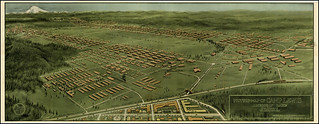
(Click on image to enlarge)
Camp Lewis in Washington, circa 1918.
Image credit: Barry Lawrence Ruderman Antique Maps Inc.
The Hobart News reported on a wartime story making the rounds in Seattle which proved that West Coast gossips were as inventive as those of Chicago.
During the summer of 1917 a vast new cantonment, then known as Camp Lewis, was hastily erected near Seattle. Covering some 70,000 acres, it was built to house about 60,000. Recruits began arriving there in September 1917. By December it was teeming with men.
According to a story of mysterious origin, the Seattle Y.W.C.A. enlisted about 3,000 young women and moved them into a special camp near the gates of Camp Lewis. Their mission: to serve as dancing partners for the men housed there — to boost morale, one supposes. The women earned a salary of $15 per week, plus a commission for every dance. Supposedly there was nothing improper going on, since the young women were under the pastoral supervision of the Seattle Ministerial Federation as well as the Y's own, but still — even for the sake of the war effort, wasn't the whole arrangement just a bit shocking?
What was shocking, the Y.W.C.A. replied, was that anybody would repeat such a blatant falsehood. There was no special camp, there were no dancing girls — at least, none recruited by the Y.W.C.A. The story was a fabrication from start to finish.
Like the Red Cross spokesman who denied the sweater story, the Seattle Y.W.C.A. spokeswoman attributed the gossip to a propaganda campaign by some unnamed pacifist organization.
A young ex-Hobart man named Ellsworth Humes brought a strange but true story home from Louisville, Kentucky.
Ellsworth had thus far had a pretty interesting career. He'd spent a couple of seasons working for the Hagenbeck-Wallace Circus and had risen to the position of press agent. When the circus ended its 1917 season, Ellsworth went to Cuba with Jess Willard's Buffalo Bill's Wild West Show. In mid-November he moved on to Louisville, Kentucky, where he landed a job as assistant advertising manager for the Gaiety Theatre.
The Gaiety management let him have a few days off in December so he could come back to Hobart and spend Christmas with his parents, Edwin and Carrie Humes. While here, he mentioned the effect produced on the theater by its proximity to Camp Zachary Taylor. The Gaiety had been a burlesque house, but lately it had been obliged to run only musical comedies — "a taboo [had] been placed upon the burlesquers." While Ellsworth did not name (or the News did not repeat) the source of the "taboo," it seems unlikely that the theatre management volunteered to change the character of its shows lest they inspire impure thoughts in the minds of any soldiers who might be in the audience. I suspect that the anti-burlesque edict came down from high in the camp's command, as part of the military's policy of suppressing "the social evil."
As social evils go, burlesque shows are pretty mild, but then one can never guard too carefully the tender innocence of a soldier, can one?
Sources:
♦ Denfeld, Duane Colt. " Fort Lewis, Part 1, 1917-1927." 16 Jan. 2008. From HistoryLink.org http://www.historylink.org/index.cfm?DisplayPage=output.cfm&file_id=8455 (accessed 26 Dec. 2010).
♦ "Local and Personal." Hobart News 1 Nov. 1917; 27 Dec. 1917.
♦ "One of the Many False Stories Going the Rounds." Hobart News 20 Dec. 1917.
♦ Untitled social column. Hobart News 12 Apr. 1917.

No comments:
Post a Comment